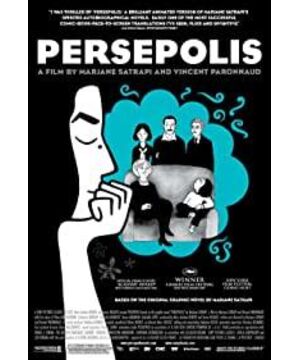"I grew up in Iran" is mixed with unique loss and sadness, which reflects the subtle disappointment and loneliness of westernized and secularized Iranian intellectuals towards the real society. Directors Vincent Paland and Marga Satapi used black and white animation to outline a imaginative world. They not only kept the character description simple and concise, but also let the images reveal rare in the heavy melancholy Humor and tenderness, wars, deaths, political persecutions, parting pains, etc., are dispelled by a gentle and long-lasting grace and affection. The reconstructed history and fanciful personal life will eventually turn into lingering permanent homesickness. The film pictures are full of Islamic characteristics. The director uses flowers, leaves, human silhouettes or unique geometric figures to construct a style of painting that is different from mainstream animation styles with straight lines, corners or curves. The music mainly uses monophonic music similar to Islamic music, mainly based on single-line melody, supplemented by necessary modifications, unique stringed instrument performance, with piano and flute slowly unfolding, through which a nostalgic person is full of Affectionate sorrows and chants are on paper.
The film is based on one of the directors, an autobiographical cartoon of the same name by Marga Satapi. As an Iranian intellectual wandering in a foreign land, and as a woman who has witnessed the political and cultural changes in Iran since 1979, she has shown a peculiar love-hate relationship with Iran. On the one hand, this country left her childhood memories, family warmth and cultural identity, which are her eternal destination and roots; on the other hand, this country has caused her to be hurt, wars are raging, family members die, and freedom is restricted. In the end, he had to travel far away and endure the malicious speculation and suspicion of people from other cultures. Revolutions and wars seem meaningless, and Islamic civilization is at stake in the process of modernization and globalization. With the industrial revolution, Christian civilization and Western culture swept the world. Western popular culture can be seen everywhere in the film. The invasion of European and American brands, popular music, especially punk music, has flourished. ABBA and Iron Maiden are both young people. A familiar band. In the face of all this, if the authorities encounter scourges, in their view, these are the objects that led to the decline and division of Islamic civilization. Western culture is the statue of Liberty transformed into skeletons in the film. They are as vicious as the Crusades. The huge impact of non-Islamic values, culture, and lifestyle has shaken the traditional social structure and family and tribal relations. The speed of changes in the socio-political and economic structure far exceeds people's ideological development level and psychological endurance. Just as people in the film were puzzled when they saw the Japanese Kako on TV, and they were very angry when they saw Godzilla raging and killing in the film. All of this is beyond the understanding of people of other civilizations.
Unlike Buddhism and Christian civilization, Muslims are born Muslims. They have no choice whether to go to temples or not. They only distinguish between good and bad Muslims, not whether they are Muslims. Islamic civilization has always advocated the unity of politics and religion. Religion affects everything about them, including politics, culture, daily life, and interpersonal relationships. At the beginning of the 20th century, Iran promoted the constitutional movement, which was later developed by the October Revolution in Russia, and the left-wing movement flourished. The communist Arush is one of the representatives in the film. From participating in instigating the independence of Azerbaijan’s Sylkham province, then drifting to Russia to learn Marxism, then being imprisoned by the Pahlavi authoritarian regime, and finally by the Iranian revolutionary government. Hanged, he seemed so untimely every moment. Arush actually symbolizes the embarrassing situation and confusion of Iranian intellectuals. The pursuit of Western-style democracy and freedom does not seem to be able to get Iran out of its predicament. The "white revolution" of the Pahlavi regime's total Westernization did not make Iran truly prosperous and strong. On the contrary, industrialization caused most of the people to be displaced, which became the bane of the regime's demise. Muslims are lost in confusion. They attribute all this to the indifference and forgetfulness of religious consciousness, to secularization and modernization. With this kind of dissatisfaction, they hope to find answers to real problems from early religious teachings, and entrust the ideals of relief from worldly suffering and national rejuvenation on the revival of Islam. As a result, a vigorous revolution occurred in Iran. The Khomeini government came to power and re-established a state-religious state, but this was obviously not the result that people expected. The hopeful intellectuals were hit again. Arush thought that a just and free society was coming, but the result was He was arrested and jailed again and sentenced to hanging. The two swans given to Mazan became a dream of freedom that Arush could hardly realize in his life.
The revolution is accompanied by the dream of liberation, but what people usher in is the harsh doctrinal stereotypes of the fundamentalists. Women put on their heads again, the prohibition is issued, and Western goods are banned. People's lives seem to be back to ancient times. The scene of secretly buying punk tapes and being caught in the street is unforgettable. The entanglement of the details of two ghost-like women with black robes and hoods and Mazan is the most pungent and ridiculous irony of the film. "A woman of good character is a woman who knows how to avoid her gaze when a man looks directly at her. It is a crime to raise her head and be punished by fire." The new government warned women in this way, but reality cannot suppress inner restlessness. When the men and women met, the scenes of violation of the rules and smiles turned back and laughed, which became the best protest against the law. This kind of decree seems to restore the original teachings of Islam, but in fact it is a disguised enslavement of women by the patriarchal society, just like Mazan’s questioning: "Is our religion to conceal our physical characteristics? Or is it just to counter fashion? ...Look at the men over there. They can wear any clothes and hair styles, and they wear tights. We can see their lower body. Why can we not do anything as women? Don’t you have the privilege of not following religion as a man?” This is the crux of the problem. The public’s dream of reviving Islamic culture has become a tool for politicians to gain personal gain. They said that there were no political prisoners after the new government was established, and Mazan was puzzled, “My uncle was put in prison under Shah’s rule, but this new regime hanged him, you tell me that there are no political prisoners anymore, you How do you explain that the 3,000 political prisoners under Shah’s rule have become 300,000 now? How can you deceive us with such lies?"
From this point of view, no matter how the political climate changes, intellectuals’ dreams of pursuing freedom are doomed to be disillusioned. In this world where life and religion are inseparable, their actions are doomed to be in vain. Under autocracy, corruption breeds prosperously, and all political crimes are nothing more than excuses for collecting money and the need for survival. Mazan said, “A few months after Shah (the King of Iran) fled the country, it seemed that this country had undergone a major transformation. Everyone became revolutionaries, and everyone became revolutionaries against Shah. We The accidental scar on the face of the neighbor (Mazan) suddenly turned into a scar caused by the war. Under the leadership of our principal, we tore out all the content about Shah in the textbook. The politics of the country seems to have taken a big turn. People who were public enemies of the country yesterday suddenly became national heroes. "Everything is like a game, and the general public are just pawns that were arbitrarily manipulated. Mazan’s father sighed when he commented on the Iran-Iraq War. He said:. "Western countries sell weapons to warring parties, we have been involved in this stupid game, senseless war for eight years, a full one million people were killed, their deaths do not make any sense"
in Islam In the doctrine, faith is based on obedience and execution, not questioning. As Allah in Mazan’s fantasy in the film said, “You have to believe that I am absolutely fair. Judgment is not what you should do. All you can do is forgive.” But these people under the influence of Western culture still start. Getting restless, secretly holding dance parties, drinking alcohol, and wearing fashionable clothes under strict political monitoring, these lives that are accustomed to the eyes of Westerners can cause fatal results here. The man who evaded police chase jumped and fell. Under the high-rise building, death on the spot, this is reality. After Arush's death, Mazan finally had doubts about God that shouldn't be there, and at this moment, she was destined to be exiled for life.
At the age of fourteen, Mazan was sent to school in Austria by her parents, where she experienced another kind of despair. When I really entered Western culture, I realized that I was just an outsider. It was so difficult to integrate into the group. The different aesthetics and value orientations of Westerners made it difficult for Mazan to adapt. The murder case shown on TV was so unfamiliar. So empty. The first love finally ushered in, but she discovered that it was just a cowardly homosexual. The suspicion and misunderstanding caused by cultural barriers became her eternal nightmare. Constantly wandering, constantly migrating, in the light of Christmas, I cried to my parents on the other side of the phone alone. For many years, I thought I knew everything about Western culture, but when I really faced it, I realized that I didn't know anything. According to classmate Mazan Austria, "Anyway, everything is in vain and life itself is meaningless. When people start to pay attention to this emptiness, they can't survive." This is the value of Westerners' dreams of life and death. Is such a society the perfect society Iranian intellectuals have always dreamed of? At this moment, the political ideals are completely shattered, and the love and warmth of the family are remembered instead. Perhaps, only home is the eternal destination of a person's soul, and relatives are the eternal harbor of a person's soul. When it is difficult, we will never leave. Mazan’s grandma is an image of humanity and responsibility. In the world that goes with the crowd and blindly follows the trend, she symbolizes the final conscience of intellectuals, that is, "people should be the same at all times", whether it is difficult or difficult. With this belief, talents have a reason to survive. When he went abroad for the first time, Mazan didn't even want to admit that he was an Iranian. When drifting again, she faced it calmly.
Taxi driver: "Where are you from?"
Mazan: "Iran."
Everything stopped abruptly, and at that moment, there was only sadness.
View more about Persepolis reviews










